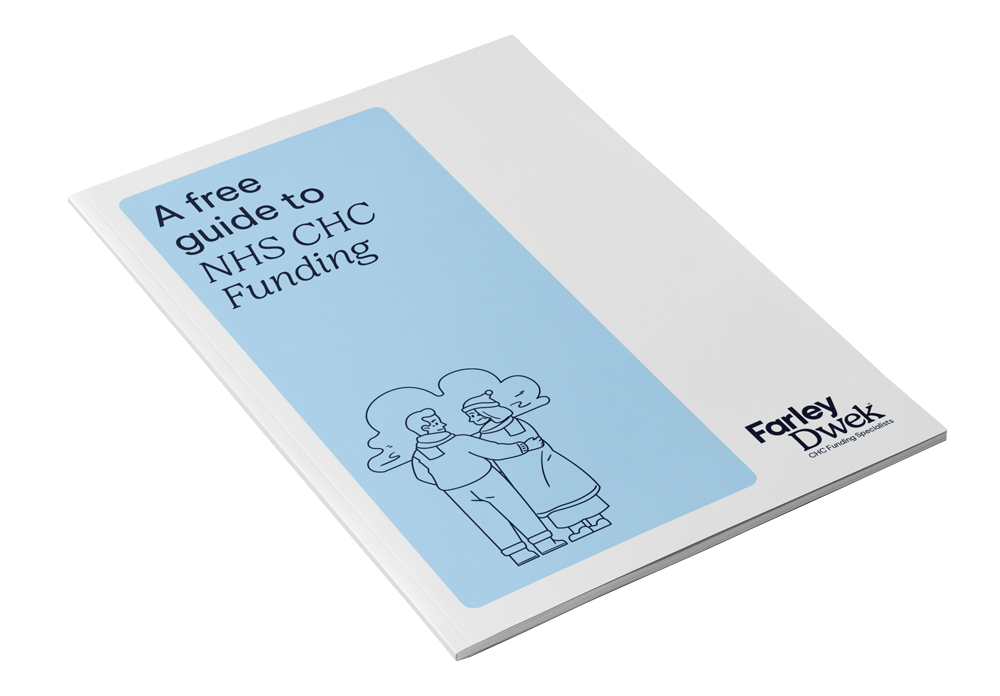Social Care Funding
Following our Clinical Review Service or a Full Assessment, you may agree that your relative’s care needs are not primarily healthcare needs. Therefore, you may not be eligible for social care funding.
In this situation, your relative’s care needs may fall under the auspices of the Local Authority/Social Services, and means-testing.
The Local Authority has its own statutory duties to ensure that a Care Plan is put in place to meet your relative’s Social Care needs, but they may have to pay for these services, subject to means-testing.
Regardless of the outcome of the means-test, a number of NHS services should always remain FREE as part of your relative’s Care Plan. These include:
- Any Primary healthcare treatment
- Any assessment of healthcare (your relative should never be charged for an assessment)
- Rehabilitation which forms part of your relative’s overall care package
- Respite healthcare
- Community health services
- Palliative and End of Life healthcare
CHC Means-Testing
The current rules in respect of means-testing are as follows:
If your relative has over £23,250 (correct as at August 2020) in capital or assets (including savings or the value of their home), they will have to pay for the cost of their care in full, until it falls below the threshold of £23,250.
If your relative has between £14,250 and £23,250 in capital, they will have to contribute towards the cost of their care under the Tariff Rules (which currently means that they will contribute £1 per week to the cost of their care for every £250 in capital they have and part thereof, between £14,250 and £23,250).
If your relative has over £23,250 in capital, they do not have to complete any means-tested assessment for Social Services. In other words, they can declare that they are self-funding and they don’t have to disclose anything else about their financial circumstances – however, they will pay for the FULL cost of their care.
If the Local Authority is meeting the full cost of your relative’s care (because they have less than £14,250 in capital), they will pay your relative’s care home costs up to their approved rate – as long as they are able to accommodate them in a care setting which is adequate to meet their needs and is within their budget.
However, if having been offered a care home which is within the Local Authority’s rate, you choose one above the approved rate, then you will have to pay the care home a top-up fee to meet any shortfall. If you can’t afford those top-up fees, then you will probably have to move into a cheaper care home that is within the Local Authority’s approved rate. However, it is up to the Local Authority to find suitable accommodation for your relative and ensure that the services provided are in accordance with their Care Plan.
Funded Nursing Care
Your relative may also qualify for NHS-Funded Nursing Care (FNC), depending on their health needs. This is a flat rate weekly payment paid by the NHS as a contribution specifically to cover the cost of nursing care provided by a registered nurse in a nursing home facility. FNC is paid tax-free and is not means-tested.
12 -Week Property Disregard: In calculating your relative’s capital, the Local Authority cannot take into account the value of their property and other assets during the first 12 weeks of care, thus giving your relative the opportunity to deal with their finances, including their property (if that’s what they decide to do).
In any event, it is important to know that the Local Authority cannot force your relative to sell their home, or take the value of their home into consideration as capital, if:
- Your relative’s partner still lives there
- A dependent under 16 lives there
- A relative over 60 lives there
- A relative who is incapacitated lives there
- Or if someone else owns a proportion of the property i.e their spouse
Even if none of the above circumstances apply, your relative can ask the Local Authority to set up a Deferred Payment Agreement in respect of their care home fees. Under this type of arrangement, the Local Authority will pay for your relative’s care, but will defer payment until their property is sold at some point in time, or after they have passed away – at which point the deferred costs of their care will be recovered from the sale proceeds or their estate.
The rule is – don’t worry about being forced to sell your relative’s home – this won’t happen. However, they may have to pay from the sale proceeds at a later stage.



